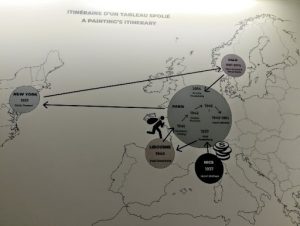 Thinking Provenance, Thinking Restitution (Cambridge/Bonn, 7-8 Dec 20)
Thinking Provenance, Thinking Restitution (Cambridge/Bonn, 7-8 Dec 20)
Cambridge, December 7 – 08, 2020
Deadline: Jun 30, 2020
Thinking Provenance, Thinking Restitution
Joint Project of the University of Cambridge and the University of Bonn
In the two decades since the 1998 ‘Washington Conference on Holocaust-Era Assets’, public awareness of Nazi era lootings, provenance research and restitution has slowly been on the rise. At Washington, governments from across the world committed to research objects in their care, and to publicise their findings with a view to achieving ‘fair and just solutions’. Museums and the art market have followed suit, with many directing new resources to investigate objects that changed hands in Europe between 1933 and 1945.
In the last five years, however, this public interest has increased exponentially. Beyond the historical focus on Nazi-era lootings, new contexts of ‘wrongful displacement’ have come into focus. In Germany for example, the country’s Lost Heritage Foundation has recently introduced state funding for research into cultural goods displaced by the East German state (2015), and in collections with colonial contexts (2018). Since 2015 new academic positions in the field of provenance research have also been established in Hamburg, Munich and Berlin. In 2018 the Centre for Provenance Research, Art and Cultural Heritage Law was established at the University of Bonn, supported by the Alfried Krupp von Bohlen und Halbach Foundation.
The time is ripe for a critical engagement with these developments, to bring together international experts and encourage Europe-wide comparison and exchange. Alongside the important technical work of establishing the facts, there is also more than ever a need for a conceptual and theoretical foundation in provenance, which reflects on the identity of objects, the agency of those involved in their movements and transactions, and the ethical challenges faced by institutions, among other aspects.
This will be the first of two workshops staged in collaboration between the Department of History of Art at the University of Cambridge and the Centre for Provenance Research, Art and Cultural Heritage Law at the University of Bonn.
At this first workshop in Cambridge, topics for proposed papers may include but are not limited to:
– comparative reviews of provenance research methodologies, and how they have advanced over time
– working towards a ‘critical theory of provenance’
– provenance as an alternative history of art
– ‘righting wrongs’, new solutions for dealing with wrongful displacements in museums
– how practices developed in the National Socialist context can be meaningfully applied, for example, to colonial-era art and artefacts
– public attitudes towards provenance and restitution
– the broader importance of provenance for the historical, archaeological and anthropological academic disciplines
– the discursive constructs in provenance and restitution practices
We solicit 20-minute papers from academics and cultural professionals at any stage of their careers. The workshop anticipates a maximum of 14 papers, which will be circulated in advance. The accepted papers will be considered for publication in a forthcoming edited volume.
The conference is planned to take place at the Museum of Archaeology and Anthropology, Cambridge, on Monday 7 and Tuesday 8 December 2020. We are particularly interested in supporting international exchange in the areas of provenance research and restitution and therefore welcome proposals from academics and cultural professionals working outside Britain. The conference language is English.
Submissions are to be made by midnight GMT, Tuesday 30 June 2020, by email with the subject line “Thinking Provenance” to both of the organisers: Dr Mary-Ann Middelkoop (maem2@cam.ac.uk) and Dr. Lucy Wasensteiner (lucy.wasensteiner@uni-bonn.de). Please combine in a single PDF file:
– A proposed title and abstract (max. 400 words) for a 20-minute paper
– A current CV
Thanks to the support of the DAAD Cambridge Research Hub for German Studies, limited funds will be available for travel and accommodation costs for participants travelling from outside Cambridge.

Leave a Reply
You must be logged in to post a comment.